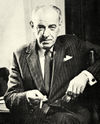The Unquiet Sleep: Difference between revisions
imported>Hayford Peirce (New article generated using Special:MetadataForm) |
imported>Hayford Peirce (brought in my template, so to speak, to get started with the next Haggard book) |
||
| Line 1: | Line 1: | ||
{{subpages}} | {{subpages}} | ||
{{TOC|right}} | |||
{{Image|William Haggard edited.jpg|left|100px|William Haggard on the back cover of [[The Conspirators]], 1967}} | |||
{{Authors|Hayford Peirce|others=y}} | |||
'''The Unquiet Sleep''' is a 1962 suspense novel by the British author [[William Haggard]] published in England by [[Cassell]] and in the United States by [[Ives Washburn]]. It was Haggard's fourth of 21 books involving his protagonist [[Colonel Charles Russell]], the head of the unobtrusive but lethal Security Executive, a government counter-intelligence agency, where he moves easily and gracefully along [[C.P. Snow|C.P. Snow's]] [[Corridors of Power (novel)|Corridors of Power]]. Like all of Haggard's books it has standard elements of suspense thrillers but in addition there is an almost [[Henry James|Henry Jamiesian]] exposition of British [[Establishment]] mores and character, in both the government and in the world of upper-class financiers, scientists, industrialists, their families, and hangers-on. | |||
==Plot== | |||
''Protagonist'' is perhaps too strong a word to describe Colonel Russell. As Haggard himself wrote about his fiction: <blockquote>My novels are chiefly novels of suspense with a background of international politics. A Colonel Charles Russell of the Security Executive, a not entirely imaginary British counter-espionage organization, while not a protagonist in the technical sense, holds the story line together in the background by his operations, while the characters in the foreground carry the action."<ref>From the back flap of the dust jacket of the Walker and Company American edition of ''The Conspirators'', New York, 1967</ref></blockquote> | |||
==Reception and/or Appraisal== | |||
Reviews were mixed: | |||
<blockquote> xxxx. </blockquote> | |||
<blockquote>''The New York Times'': xxxxx .<ref>Anthony Boucher, ''Criminals at Large'', ''The New York Times'', January 24, 1960 at [http:///timesmachine.nytimes.com/timesmachine/1960/01/24/119094050.html?pageNumber=139]</ref></blockquote> | |||
<blockquote>Anthony Cronin, ''Times Literary Supplement'', date unknown: xxxxx </blockquote> | |||
<blockquote>''Kirkus Reviews'': xxxxx <ref>''Kirkus Reviews'', January 20, 1960 at: [https://www.kirkusreviews.com/book-reviews/a/william-haggard/venetian-blind/]</ref></blockquote> | |||
==References== | |||
<references/> | |||
Revision as of 15:17, 3 October 2020
Authors [about]:
join in to develop this article! |
The Unquiet Sleep is a 1962 suspense novel by the British author William Haggard published in England by Cassell and in the United States by Ives Washburn. It was Haggard's fourth of 21 books involving his protagonist Colonel Charles Russell, the head of the unobtrusive but lethal Security Executive, a government counter-intelligence agency, where he moves easily and gracefully along C.P. Snow's Corridors of Power. Like all of Haggard's books it has standard elements of suspense thrillers but in addition there is an almost Henry Jamiesian exposition of British Establishment mores and character, in both the government and in the world of upper-class financiers, scientists, industrialists, their families, and hangers-on.
Plot
Protagonist is perhaps too strong a word to describe Colonel Russell. As Haggard himself wrote about his fiction:
My novels are chiefly novels of suspense with a background of international politics. A Colonel Charles Russell of the Security Executive, a not entirely imaginary British counter-espionage organization, while not a protagonist in the technical sense, holds the story line together in the background by his operations, while the characters in the foreground carry the action."[1]
Reception and/or Appraisal
Reviews were mixed:
xxxx.
The New York Times: xxxxx .[2]
Anthony Cronin, Times Literary Supplement, date unknown: xxxxx
Kirkus Reviews: xxxxx [3]
